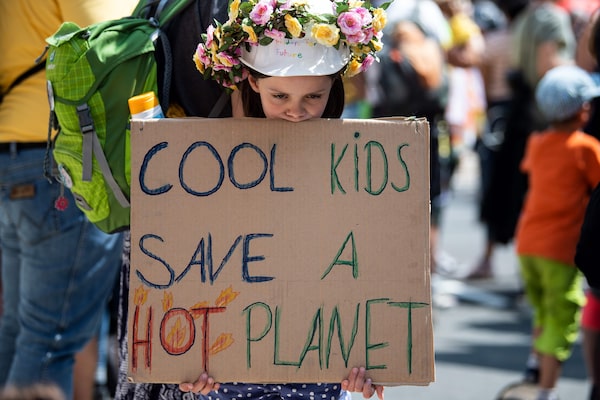
Eight-years-old Ida holds a poster reading "Cool kids save a hot planet" as she takes part in a Fridays For Future demonstration for climate protection in Juechen, western Germany, on June 22, 2019.FEDERICO GAMBARINI/AFP/Getty Images
Let’s Talk Science and the Royal Society of Canada have partnered to provide Globe and Mail readers with relevant coverage about issues that affect us all – from education to the impact of leading-edge scientific discoveries.
Ruth Silver, Principal, Groundswell Projects & Emma Jo Aiken-Klar, Phd, Lead Researcher, Climate Action Lab, powered by Let’s Talk Science.
Climate change has become a climate crisis. Around the globe, climate related outcomes are converging and exponentially changing our day-to-day experiences; weather is becoming more violent and unpredictable, we’re losing biodiversity at an unprecedented rate, food production is precarious, climate migration is inextricably linked to socio-political instability and environmental pollution has become the number one threat to human health. Today’s teenagers know this is the world they will one day lead. The 2020s are an inflection point where collectively we must decide how we’ll deal with this, so it’s best to include youth now in the process of discussion, planning and action. Young people deserve to have their voices heard when it comes to climate action.
Young people need to be heard and listened to
There are so many incredible innovations happening, from how we interact with one another to new approaches to energy production and everything in between - the limitations are bound only by human creativity. But if we don’t include everyone in solving this crisis, we will limit the possibilities; the need for equity, diversity, and inclusion in everything we do is clear. When it comes to climate, we need to create meaningful, accessible and relevant ways to include everyone, especially youth, as we embark on designing new futures.
By combining ethnographic and community-based research, we can do just that. Ethnographic research is an important tool in anthropology that “makes the strange familiar, and the familiar strange;” allowing us to uncover the taken-for-granted assumptions that make up how we understand ourselves and the world around us, offering the possibility to see old problems with fresh eyes. Community-based research is a deeply equitable process that seeks to democratize knowledge and knowledge creation by valuing all perspectives of all members of a community, and involving them in the research process itself. The goal is to uncover the unsaid, the tangle of feelings, perceptions and experiences that shape the world views, expectations and motivations of teens in Canada today, so that through supportive community learning, we may co-create the most relevant and impactful ways to engage with climate action.
Opening the Door
A unique project aims to do just that. Over three months this spring the Climate Action Lab - powered by Let’s Talk Science - will work with youth from coast to coast to coast to uncover how to engage teens in climate action, from their perspectives. 100 high school researchers will be supported by 16 university student coaches as they learn how to lead ethnographic and community based research. They’ll spend a week learning how to conduct research, 6 weeks in-field doing research with their friends and educators. University coaches will guide the analysis of their findings and help them explore where the experience could take them in the future, in intimate small group settings with scientists from the Royal Society of Canada. Finally, they will celebrate and share their findings in a co-authored insights report and through social media.
Climate change is a deeply systemic set of problems that will require radically new perspectives to drive long-term solutions. It makes sense that climate actions made for Canadian youth by Canadian youth will offer us new insights on how to approach the challenge in new ways. Projects like these allow youth to actively engage in identifying innovative approaches - encouraging them to be active participants in finding and acting on the solutions that will impact their world.
Know any curious teenagers or university students? Encourage them to find out more at climateactionlab.ca